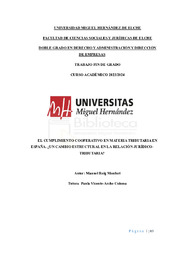Please use this identifier to cite or link to this item:
https://hdl.handle.net/11000/33875Full metadata record
| DC Field | Value | Language |
|---|---|---|
| dc.contributor.advisor | VICENTE-ARCHE COLOMA, PAULA | - |
| dc.contributor.author | Roig Monfort, Manuel | - |
| dc.contributor.other | Departamentos de la UMH::Ciencia Jurídica | es_ES |
| dc.date.accessioned | 2024-11-18T09:32:06Z | - |
| dc.date.available | 2024-11-18T09:32:06Z | - |
| dc.date.created | 2024-09 | - |
| dc.identifier.uri | https://hdl.handle.net/11000/33875 | - |
| dc.description.abstract | Uno de los grandes problemas que presenta el sistema tributario español, tanto históricamente como en la actualidad, es la gran conflictividad existente entre la Administración Tributaria y los contribuyentes. Una de las soluciones que más se ha incentivado en los últimos años es el cambio hacia un nuevo modelo de relación entre las partes. Este concepto recibe el nombre de “cumplimiento cooperativo” y trata de redireccionar la continua relación conflictiva de las partes hacia una relación basada en la confianza mutua, la buena fe y la transparencia. El objetivo de este trabajo consiste en analizar y comprender el Cumplimiento Cooperativo en España para determinar si realmente este modelo de relación ha llegado para quedarse. Empezando por su evolución histórica hasta llegar a la posición actual, para poder observar los progresos que han surgido. A continuación, mediante el análisis de las principales manifestaciones de este nuevo modelo en España, los Códigos de Buenas Prácticas Tributarias y una referencia a la norma UNE 19602, observaremos cuales son los objetivos y beneficios de estas manifestaciones para ambas partes y si se cumplen en la realidad. Por último, teniendo en cuenta el análisis previo, concluiremos sobre si los avances producidos son suficientes para que haya un verdadero cambio en la relación jurídico-tributaria, o si, por el contrario, se deben dar otros pasos más firmes y decididos para conseguir ese cambio estructural en las relaciones entre la Administración Tributaria y los contribuyentes. | es_ES |
| dc.description.abstract | One of the biggest problems of the Spanish tax system, both historically and currently, is the great conflict between the Tax Administration and taxpayers. One of the solutions that has been most encouraged in recent years is the change towards a new model of relationship between the parts. This concept is called “Cooperative Compliance” and tries to redirect the continuous conflictive relationship between the parts towards a relationship based on mutual trust, good faith and transparency. The aim of this project is to analyze and understand Cooperative Compliance in Spain in order to determine whether this relationship model is really here to stay. Starting with its historical evolution until reaching the current position, in order to observe the progress that has been made. Then, by analyzing the main manifestations of this new model in Spain, the Codes of Good Tax Practices and a reference to the UNE 19602 rule, we will observe which are the objectives and benefits of these manifestations for both parts and if they are accomplished in reality. Finally, considering the previous analysis, we will conclude on whether the steps taken are enough to bring about a real change in tax relations, or whether, on the contrary, other more decisive and firm steps must be taken to achieve this structural change in the relations between the Tax Administration and the taxpayers. | es_ES |
| dc.format | application/pdf | es_ES |
| dc.format.extent | 65 | es_ES |
| dc.language.iso | spa | es_ES |
| dc.publisher | Universidad Miguel Hernández de Elche | es_ES |
| dc.rights | info:eu-repo/semantics/openAccess | es_ES |
| dc.rights | Attribution-NonCommercial-NoDerivatives 4.0 Internacional | * |
| dc.rights.uri | http://creativecommons.org/licenses/by-nc-nd/4.0/ | * |
| dc.subject | Cumplimiento Cooperativo | es_ES |
| dc.subject | Cambio Estructural | es_ES |
| dc.subject | Relaciones Tributarias | es_ES |
| dc.subject | Cooperative Compliance | es_ES |
| dc.subject | Structural Change | es_ES |
| dc.subject | Tax Relations | es_ES |
| dc.subject.other | CDU::3 - Ciencias sociales::34 - Derecho | es_ES |
| dc.title | El cumplimiento cooperativo en materia tributaria en España. ¿Un cambio estructural en la relación jurídico-tributaria? | es_ES |
| dc.type | info:eu-repo/semantics/bachelorThesis | es_ES |

View/Open:
ROIG MONFORT, MANUEL.pdf
1,4 MB
Adobe PDF
Share:
.png)
